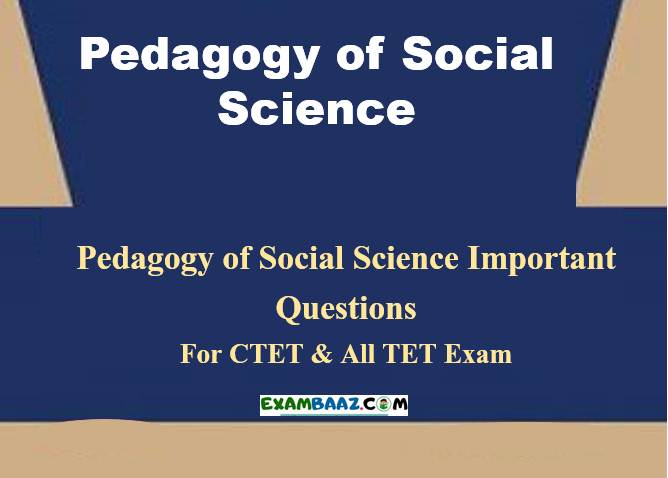Pedagogy of Social Science In English
Q1 Critical thinking is an important component of-
(a)Education
(b)Politics and business
(c)Science
(d)All of these
Ans. (d)
Q2 Creation of a situation can be made by:
(a) reading a parallel poem
(b) showing pictures
(c) giving the lifestyle of the poet
(d) all of the above
Ans. (d)
Q3 ‘Team Teaching’-
(a)Involves teams of teachers to optimize resources, interest, and expertise
(b)Involves small teams of students as per their ability
(c)Is a way to manage with the shortage of teachers
(d)Encourage healthy competition among teams of teachers in a school
Ans. (a)
Q4 Partial reinforcement
(a) is more effective than continuous reinforcement
(b) is less effective than continuous reinforcement
(c) cannot be applied in actual classrooms
(d) works best in training animals
Ans. (a)
Q5 Which one is not included under the visual aids?
(a)Maps
(b)Globe
(c)Pictures
(d)None of the above
Ans. (d)
Q6 Life history of an individual written by the writer himself is called:
(a) story
(b) autobiography
(c) novel
(d) none of these
Ans. (b)
Q7 ————-learning activities are similar to case studies but usually focus on qualitative problems and gives students a deeper learning opportunity.
(a)Problem-based
(b)Think pair share
(c)Freewriting
(d)None of these
Ans. (a)
Q8 Which of the following is the characteristic of programmed instruction?
(a) Student’s reinforcement
(b) Student’s activity
(c) The immediate result of the student’s performance
(d) All of these
Ans. (d)
Also Read: skinners operant conditioning theory
Q9 School learning is a function of time, i.e. school learning= f (time spent/time needed), this formula is given by-
(a)E.B Wesley
(b)John Carroll
(c)John Jarolimick
(d)None of these
Ans. (b)
Q10 Social studies deals with-
(a)Society
(b)Environment
(c)Culture
(d)All of these
Ans. (d)
Q11Previous knowledge of the students depends on the following:
(a) age and mental level
(b) class and background
(c) both (A) & (B)
(d) none of these
Ans. (c)Pedagogy of Social Science In English
Q12 Which one of the following is not a major type of students evaluation-
(a)Summative
(b)Formative
(c) Hobbies
(d)None of these
Ans. (c)
Maths Pedagogy Study material: Click here
Q13 Which of the following principles is not involved in lesson planning?
(a) rigidity of planning
(b) knowledge of pupils
(c) clarity of objectives
(d) knowledge of teaching
Ans. (a)
Q14 What does “self-regulation of learners” mean?
(a) rules and regulations made by the student body
(b) creating regulations for student behavior
(c) self-discipline and control
(d) ability to monitor their own learning
Ans. (d)
Q15 Formative evaluation is not based on-
(a)Objective type question
(b)Long essay type question
(c)Project work
(d)Activity-based work
Ans. (b)
Q16 A teacher collects and reads the work of the class then plans and adjusts the next lesson to meet student needs. He is doing
(a) Assessment of Learning
(b) Assessment as Learning
(c) Assessment for Learning
(d) Assessment of Learning
Ans. (c)
Q17 Cultural, social and class differences generate their own biases and prejudice and attitude in classroom contexts. The approach towards teaching, therefore, needs to be-
(a)Project-oriented
(b)Discussion oriented
(c)Open-ended
(d)Lecture methods
Ans. (c)
Q18 When delivering an effective lecture in the classroom, a teacher;
(a) establishes an eye contact
(b) varies pitch and tone
(c) employs meaningful gestures.
(d) all of the above
Ans. (d)
Q19 Which one of the following is not needed for learning activities outside the classroom?
(a)Teacher preparation
(b)Executive of the activity
(c)Evaluation
(d)Publishing
Ans. (d)
Q20 Aptitude test plays a significant role in
(a) group guidance
(b) educational guidance
(c) vocational guidance
(d) None of these
Ans. (c)
For The Latest Activities And News Follow Our Social Media Handles:
-
-
- Facebook: ExamBaaz
- Twitter: ExamBaaz
- Telegram: ExamBaaz Study Material
-
Related articles :
जीन पियाजे का संज्ञानात्मक विकास का सिद्धांत
वाइगोत्सकी का संज्ञानात्मक विकास सिद्धांत
Social Science Teaching Methods
अल्बर्ट बंडूरा का सामाजिक अधिगम सिद्धांत
Yashpal Committee Report Important Questions
Micro Teaching Notes For CTET, DSSSB, KVS, NVS
बाल विकास एवं शिक्षा मनोविज्ञान के महत्वपूर्ण सिद्धांत NOTES for Teacher’s Exam
